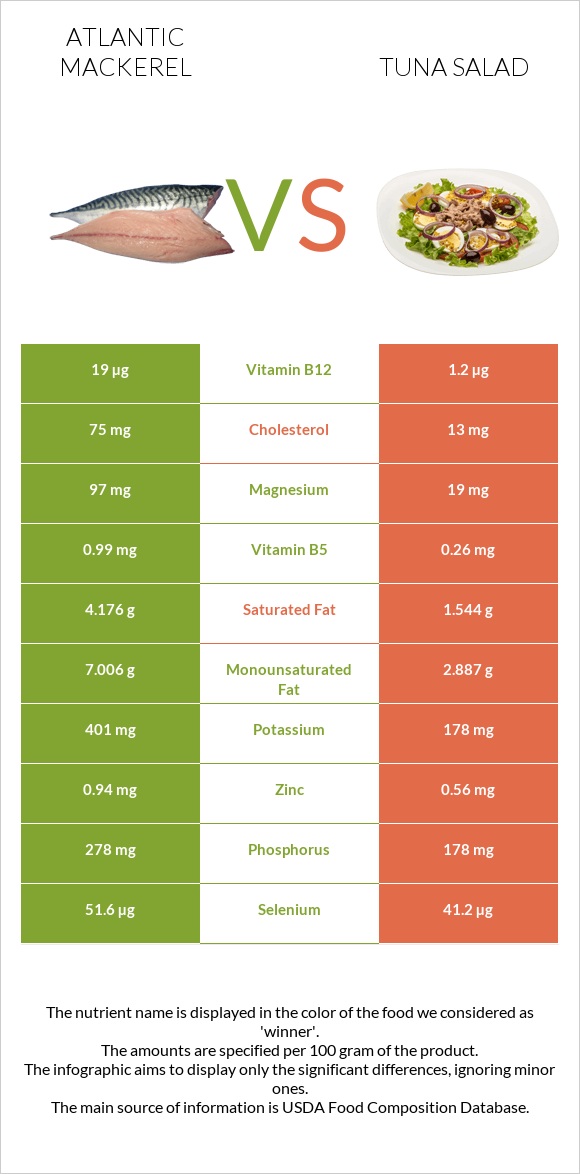Atlantic Mackerel vs. Tuna salad — In-Depth Nutrition Comparison
Compare
The main differences between atlantic Mackerel and tuna salad
- Atlantic Mackerel is richer than tuna salad in vitamin B12, vitamin B6, vitamin B2, vitamin B3, magnesium, vitamin B1, and vitamin B5.
- Daily need coverage for vitamin B12 for atlantic Mackerel is 313% higher.
- Atlantic Mackerel contains 6 times more vitamin B1 than tuna salad. Atlantic Mackerel contains 0.176mg of vitamin B1, while tuna salad contains 0.031mg.
- Tuna salad contains less cholesterol.
Food types used in this article are Fish, mackerel, Atlantic, raw and Fish, tuna salad.
Infographic

Infographic link
Mineral Comparison
Mineral comparison score is based on the number of minerals by which one or the other food is richer. The "coverage" charts below show how much of the daily needs can be covered by 300 grams of the food.
| Contains more MagnesiumMagnesium | +300% |
| Contains more PotassiumPotassium | +76.4% |
| Contains more IronIron | +63% |
| Contains more ZincZinc | +12.5% |
| Contains more PhosphorusPhosphorus | +21.9% |
| Contains less SodiumSodium | -77.6% |
| Contains more CalciumCalcium | +41.7% |
| Contains more CopperCopper | +98.6% |
| Contains more ManganeseManganese | +166.7% |
Vitamin Comparison
Vitamin comparison score is based on the number of vitamins by which one or the other food is richer. The "coverage" charts below show how much of the daily needs can be covered by 300 grams of the food.
| Contains more Vitamin AVitamin A | +108.3% |
| Contains more Vitamin EVitamin E | +∞% |
| Contains more Vitamin DVitamin D | +∞% |
| Contains more Vitamin B1Vitamin B1 | +467.7% |
| Contains more Vitamin B2Vitamin B2 | +345.7% |
| Contains more Vitamin B3Vitamin B3 | +35.5% |
| Contains more Vitamin B5Vitamin B5 | +229.2% |
| Contains more Vitamin B6Vitamin B6 | +392.6% |
| Contains more Vitamin B12Vitamin B12 | +625.8% |
| Contains more Vitamin KVitamin K | +∞% |
| Contains more CholineCholine | +∞% |
| Contains more Vitamin CVitamin C | +450% |
| Contains more FolateFolate | +700% |
All nutrients comparison - raw data values
| Nutrient |  |
 |
DV% diff. |
| Vitamin B12 | 8.71µg | 1.2µg | 313% |
| Vitamin D | 16.1µg | 81% | |
| Vitamin D | 643IU | 80% | |
| Vitamin B6 | 0.399mg | 0.081mg | 24% |
| Cholesterol | 70mg | 13mg | 19% |
| Vitamin B2 | 0.312mg | 0.07mg | 19% |
| Vitamin B3 | 9.08mg | 6.7mg | 15% |
| Sodium | 90mg | 402mg | 14% |
| Magnesium | 76mg | 19mg | 14% |
| Vitamin B5 | 0.856mg | 0.26mg | 12% |
| Vitamin B1 | 0.176mg | 0.031mg | 12% |
| Choline | 65mg | 12% | |
| Vitamin E | 1.52mg | 10% | |
| Iron | 1.63mg | 1mg | 8% |
| Copper | 0.073mg | 0.145mg | 8% |
| Saturated fat | 3.257g | 1.544g | 8% |
| Fats | 13.89g | 9.26g | 7% |
| Phosphorus | 217mg | 178mg | 6% |
| Monounsaturated fat | 5.456g | 2.887g | 6% |
| Selenium | 44.1µg | 41.2µg | 5% |
| Protein | 18.6g | 16.04g | 5% |
| Polyunsaturated fat | 3.35g | 4.122g | 5% |
| Potassium | 314mg | 178mg | 4% |
| Vitamin K | 5µg | 4% | |
| Vitamin A | 50µg | 24µg | 3% |
| Carbs | 0g | 9.41g | 3% |
| Folate | 1µg | 8µg | 2% |
| Vitamin C | 0.4mg | 2.2mg | 2% |
| Calories | 205kcal | 187kcal | 1% |
| Manganese | 0.015mg | 0.04mg | 1% |
| Zinc | 0.63mg | 0.56mg | 1% |
| Calcium | 12mg | 17mg | 1% |
| Net carbs | 0g | 9.41g | N/A |
| Tryptophan | 0.208mg | 0.18mg | 0% |
| Threonine | 0.815mg | 0.701mg | 0% |
| Isoleucine | 0.857mg | 0.739mg | 0% |
| Leucine | 1.512mg | 1.293mg | 0% |
| Lysine | 1.708mg | 1.457mg | 0% |
| Methionine | 0.551mg | 0.47mg | 0% |
| Phenylalanine | 0.726mg | 0.626mg | 0% |
| Valine | 0.958mg | 0.824mg | 0% |
| Histidine | 0.548mg | 0.467mg | 0% |
| Omega-3 - EPA | 0.898g | 0.014g | N/A |
| Omega-3 - DHA | 1.401g | 0.055g | N/A |
| Omega-3 - DPA | 0.212g | N/A |
Macronutrient Comparison
Macronutrient breakdown side-by-side comparison
Protein:
18.6 g
Fats:
13.89 g
Carbs:
0 g
Water:
63.55 g
Other:
3.96 g
Protein:
16.04 g
Fats:
9.26 g
Carbs:
9.41 g
Water:
63.16 g
Other:
2.13 g
| Contains more ProteinProtein | +16% |
| Contains more FatsFats | +50% |
| Contains more OtherOther | +85.9% |
| Contains more CarbsCarbs | +∞% |
~equal in
Water
~63.16g
Fat Type Comparison
Fat type breakdown side-by-side comparison
Saturated fat:
Sat. Fat
3.257 g
Monounsaturated fat:
Mono. Fat
5.456 g
Polyunsaturated fat:
Poly. Fat
3.35 g
Saturated fat:
Sat. Fat
1.544 g
Monounsaturated fat:
Mono. Fat
2.887 g
Polyunsaturated fat:
Poly. Fat
4.122 g
| Contains more Mono. FatMonounsaturated fat | +89% |
| Contains less Sat. FatSaturated fat | -52.6% |
| Contains more Poly. FatPolyunsaturated fat | +23% |